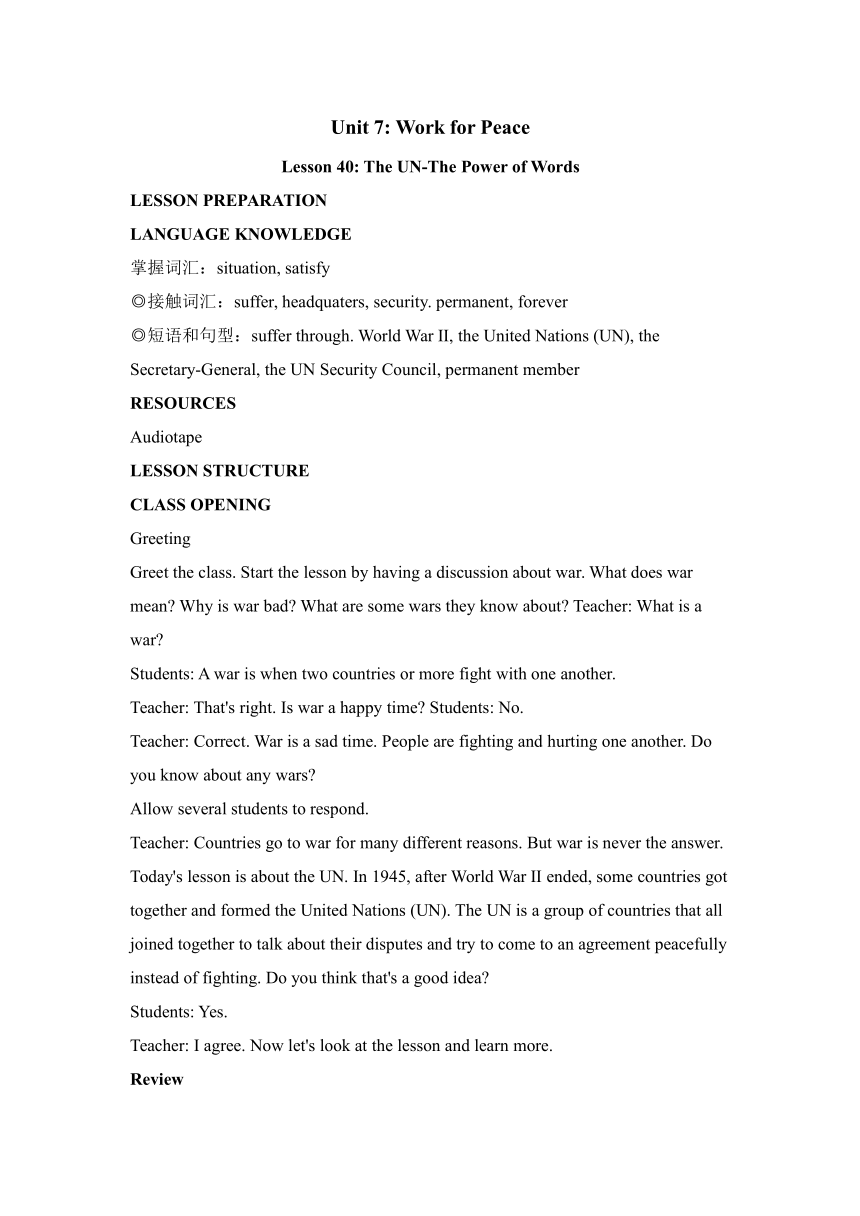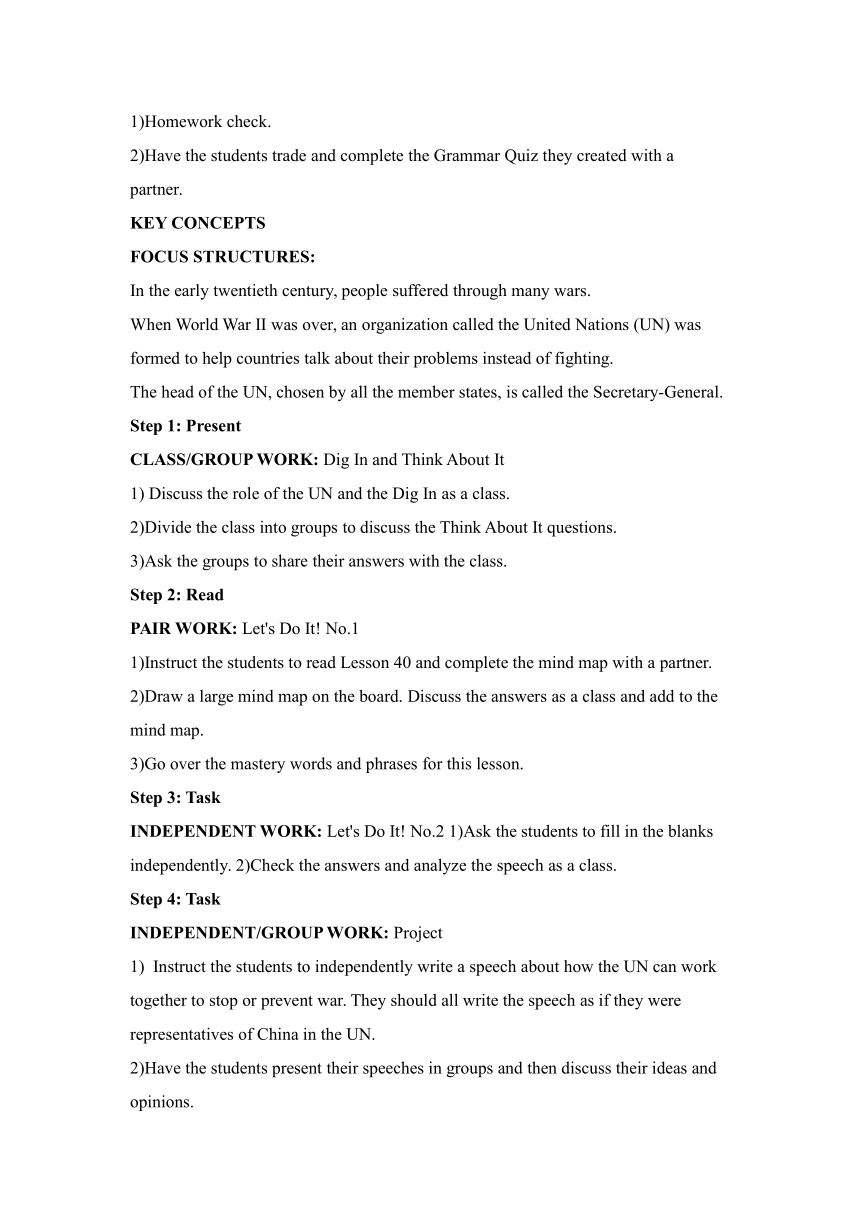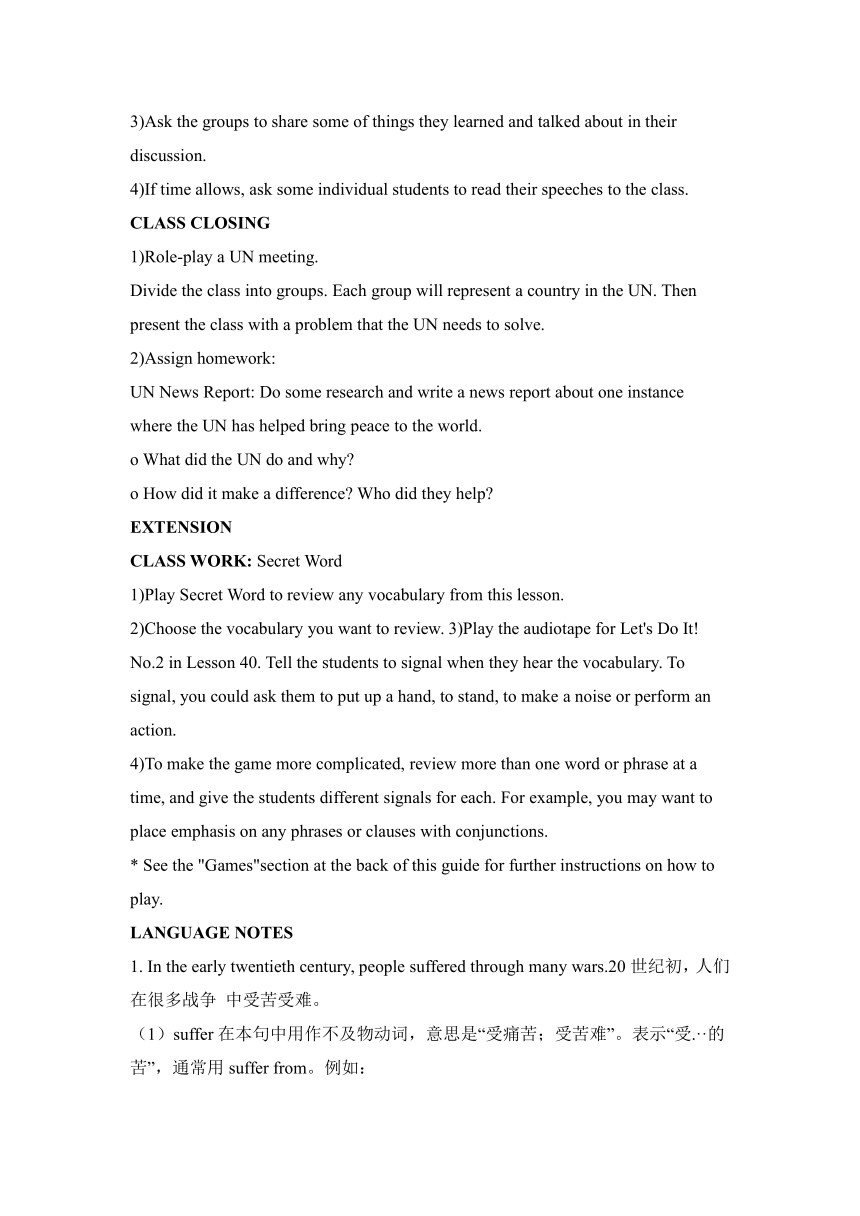Unit 7 Work for Peace.Lesson40教案
文档属性
| 名称 | Unit 7 Work for Peace.Lesson40教案 |  | |
| 格式 | docx | ||
| 文件大小 | 18.5KB | ||
| 资源类型 | 教案 | ||
| 版本资源 | 冀教版 | ||
| 科目 | 英语 | ||
| 更新时间 | 2024-12-21 09:56:41 | ||
图片预览



文档简介
Unit 7: Work for Peace
Lesson 40: The UN-The Power of Words
LESSON PREPARATION
LANGUAGE KNOWLEDGE
掌握词汇:situation, satisfy
◎接触词汇:suffer, headquaters, security. permanent, forever
◎短语和句型:suffer through. World War II, the United Nations (UN), the Secretary-General, the UN Security Council, permanent member
RESOURCES
Audiotape
LESSON STRUCTURE
CLASS OPENING
Greeting
Greet the class. Start the lesson by having a discussion about war. What does war mean Why is war bad What are some wars they know about Teacher: What is a war
Students: A war is when two countries or more fight with one another.
Teacher: That's right. Is war a happy time Students: No.
Teacher: Correct. War is a sad time. People are fighting and hurting one another. Do you know about any wars
Allow several students to respond.
Teacher: Countries go to war for many different reasons. But war is never the answer. Today's lesson is about the UN. In 1945, after World War II ended, some countries got together and formed the United Nations (UN). The UN is a group of countries that all joined together to talk about their disputes and try to come to an agreement peacefully instead of fighting. Do you think that's a good idea
Students: Yes.
Teacher: I agree. Now let's look at the lesson and learn more.
Review
1)Homework check.
2)Have the students trade and complete the Grammar Quiz they created with a partner.
KEY CONCEPTS
FOCUS STRUCTURES:
In the early twentieth century, people suffered through many wars.
When World War II was over, an organization called the United Nations (UN) was formed to help countries talk about their problems instead of fighting.
The head of the UN, chosen by all the member states, is called the Secretary-General.
Step 1: Present
CLASS/GROUP WORK: Dig In and Think About It
1) Discuss the role of the UN and the Dig In as a class.
2)Divide the class into groups to discuss the Think About It questions.
3)Ask the groups to share their answers with the class.
Step 2: Read
PAIR WORK: Let's Do It! No.1
1)Instruct the students to read Lesson 40 and complete the mind map with a partner.
2)Draw a large mind map on the board. Discuss the answers as a class and add to the mind map.
3)Go over the mastery words and phrases for this lesson.
Step 3: Task
INDEPENDENT WORK: Let's Do It! No.2 1)Ask the students to fill in the blanks independently. 2)Check the answers and analyze the speech as a class.
Step 4: Task
INDEPENDENT/GROUP WORK: Project
Instruct the students to independently write a speech about how the UN can work together to stop or prevent war. They should all write the speech as if they were representatives of China in the UN.
2)Have the students present their speeches in groups and then discuss their ideas and opinions.
3)Ask the groups to share some of things they learned and talked about in their discussion.
4)If time allows, ask some individual students to read their speeches to the class.
CLASS CLOSING
1)Role-play a UN meeting.
Divide the class into groups. Each group will represent a country in the UN. Then present the class with a problem that the UN needs to solve.
2)Assign homework:
UN News Report: Do some research and write a news report about one instance where the UN has helped bring peace to the world.
o What did the UN do and why
o How did it make a difference Who did they help
EXTENSION
CLASS WORK: Secret Word
1)Play Secret Word to review any vocabulary from this lesson.
2)Choose the vocabulary you want to review. 3)Play the audiotape for Let's Do It! No.2 in Lesson 40. Tell the students to signal when they hear the vocabulary. To signal, you could ask them to put up a hand, to stand, to make a noise or perform an action.
4)To make the game more complicated, review more than one word or phrase at a time, and give the students different signals for each. For example, you may want to place emphasis on any phrases or clauses with conjunctions.
* See the "Games"section at the back of this guide for further instructions on how to play.
LANGUAGE NOTES
1. In the early twentieth century, people suffered through many wars.20世纪初,人们在很多战争 中受苦受难。
(1)suffer在本句中用作不及物动词,意思是“受痛苦;受苦难”。表示“受.··的苦”,通常用suffer from。例如:
The patient is still suffering.病人仍很痛苦。 I am suffering from a headache.我正在遭受头痛之 苦。
They suffered from a serious flood last year.去年他 们遭受一场大水灾。
(2)through的意思是“在整个···期间;从头至尾”。例如:
He studied his project through the night. 他研究他 的课题研究了一整夜。
I will read through the novel. 我要把这本小说从头 至尾看一遍。
2. The headquarters of the UN is in New York City. 联合国总部在纽约市。
headquarters 是一个单复同形的名词,意思是“总部,总机构;司令部,指挥部”。这样的词还有means(方法,手段),works(工厂),species(种类),series(系列),barracks(营房)等,其后
动词的单复数形式取决于这些名词是用作单数,还是用作复数。例如:
A headquarters was set up to direct the battle.建立 了一个司令部来指挥战斗。
The two headquarters are near.那两个总部离得很 近。
The only means to pass exams is to study hard. 通过 考试的唯一办法是努力学习。
All means have been tried out to solve the problem. 为解决这个问题,所有方法都尝试过了。
A new works has been built up in our town.我们城 里建了一座新工厂。
How many works are there in the city 这城市里有 多少家工厂?
3. The UN Security Council has fifteen members, five of which are permanent members -China, France, Russia, the U.K. and the U.S.联合国安理会有15个 成员国,其中5个为常任理事国——中国、法国、俄罗斯、英国和美国。
of which/whom 常与 some, any, many, few, most, all, either, neither, none 或基数词连用,of表部分关系, 含义为“其中···”。以上不定代词或基数词也可以置于of which/whom之后。例如:
He asked question after question, some of which we couldn't answer.他问了一个又一个问题,其中一些我们不能回答。
I picked up the apples, three of which were badly bruised.我拾起了那些苹果,其中有三个已经摔坏了。
He always had to worry about neighboring kings, many of whom were unfriendly and threatening.他 总是对邻近的国王们忧心忡忡,那些国王中有很多不友善,具有威胁性。
I have many friends, of whom none is a businessman. 我有许多朋友,其中没有一个是商人。
I live in a house, the windows of which face south.= I live in a house. of which the windows face south. I live in a house. whose windows face south. 住在一所房子里,房子的窗户朝南。
4. It is not always easy for the members to reach an agreement.成员们达成协议不总是容易的。
本句中it是形式主语,实际主语是带逻辑主语的动词不定式 for the members to reach an agreement。
动词不定式的逻辑主语由for引出,这与前面作
表语的形容词有关系。如果前面是表示人的品格的形容词,如kind,clever, foolish, careful,nice等 作表语,则用of引出动词不定式的逻辑主语。例如:
It is kind of you to help me with my English. (=You are kind to help me with my English.)你帮我学英 语太好了。
It was foolish of him to meet her again. (=He was foolish to meet her again.)他跟她再次见面是愚蠢 的。
It was careless of her to make such a mistake. (=She was careless to make such a mistake.)犯这样一个 错误,她太粗心了。
5. Just imagine how difficult it is to satisfy all 193 members!试请想像一下,让所有193个成员(国)都满意是多么的困滩呀!
just是副词,用于祈使句中的意思是“试请,且请”起加强语气的作用。例如:
Just look at the strange figure!且看那个奇怪的东 西!
Just listen to him!且听他说些什么! Just a moment!请稍等!
6. Let's hope that the great idea they had in 1945 to prevent war will last forever.让我们期待着他们 1945年想出的阻止战争的理念永远传下去吧。
that 引导 hope 的宾语从句,从句的谓语是willlast。 they had in 1945和 to prevent war 都是 idea 的定语,前者是省略了that的宾语从句,后者是动词不定式。表示“··理念(思想)”,还可用of短语作定语。例如:
Do you understand the general idea of what I said 你明白我的话的大意吗?
My purpose is to get a better idea of education.我的 目的是更好地了解教育。
Lesson 40: The UN-The Power of Words
LESSON PREPARATION
LANGUAGE KNOWLEDGE
掌握词汇:situation, satisfy
◎接触词汇:suffer, headquaters, security. permanent, forever
◎短语和句型:suffer through. World War II, the United Nations (UN), the Secretary-General, the UN Security Council, permanent member
RESOURCES
Audiotape
LESSON STRUCTURE
CLASS OPENING
Greeting
Greet the class. Start the lesson by having a discussion about war. What does war mean Why is war bad What are some wars they know about Teacher: What is a war
Students: A war is when two countries or more fight with one another.
Teacher: That's right. Is war a happy time Students: No.
Teacher: Correct. War is a sad time. People are fighting and hurting one another. Do you know about any wars
Allow several students to respond.
Teacher: Countries go to war for many different reasons. But war is never the answer. Today's lesson is about the UN. In 1945, after World War II ended, some countries got together and formed the United Nations (UN). The UN is a group of countries that all joined together to talk about their disputes and try to come to an agreement peacefully instead of fighting. Do you think that's a good idea
Students: Yes.
Teacher: I agree. Now let's look at the lesson and learn more.
Review
1)Homework check.
2)Have the students trade and complete the Grammar Quiz they created with a partner.
KEY CONCEPTS
FOCUS STRUCTURES:
In the early twentieth century, people suffered through many wars.
When World War II was over, an organization called the United Nations (UN) was formed to help countries talk about their problems instead of fighting.
The head of the UN, chosen by all the member states, is called the Secretary-General.
Step 1: Present
CLASS/GROUP WORK: Dig In and Think About It
1) Discuss the role of the UN and the Dig In as a class.
2)Divide the class into groups to discuss the Think About It questions.
3)Ask the groups to share their answers with the class.
Step 2: Read
PAIR WORK: Let's Do It! No.1
1)Instruct the students to read Lesson 40 and complete the mind map with a partner.
2)Draw a large mind map on the board. Discuss the answers as a class and add to the mind map.
3)Go over the mastery words and phrases for this lesson.
Step 3: Task
INDEPENDENT WORK: Let's Do It! No.2 1)Ask the students to fill in the blanks independently. 2)Check the answers and analyze the speech as a class.
Step 4: Task
INDEPENDENT/GROUP WORK: Project
Instruct the students to independently write a speech about how the UN can work together to stop or prevent war. They should all write the speech as if they were representatives of China in the UN.
2)Have the students present their speeches in groups and then discuss their ideas and opinions.
3)Ask the groups to share some of things they learned and talked about in their discussion.
4)If time allows, ask some individual students to read their speeches to the class.
CLASS CLOSING
1)Role-play a UN meeting.
Divide the class into groups. Each group will represent a country in the UN. Then present the class with a problem that the UN needs to solve.
2)Assign homework:
UN News Report: Do some research and write a news report about one instance where the UN has helped bring peace to the world.
o What did the UN do and why
o How did it make a difference Who did they help
EXTENSION
CLASS WORK: Secret Word
1)Play Secret Word to review any vocabulary from this lesson.
2)Choose the vocabulary you want to review. 3)Play the audiotape for Let's Do It! No.2 in Lesson 40. Tell the students to signal when they hear the vocabulary. To signal, you could ask them to put up a hand, to stand, to make a noise or perform an action.
4)To make the game more complicated, review more than one word or phrase at a time, and give the students different signals for each. For example, you may want to place emphasis on any phrases or clauses with conjunctions.
* See the "Games"section at the back of this guide for further instructions on how to play.
LANGUAGE NOTES
1. In the early twentieth century, people suffered through many wars.20世纪初,人们在很多战争 中受苦受难。
(1)suffer在本句中用作不及物动词,意思是“受痛苦;受苦难”。表示“受.··的苦”,通常用suffer from。例如:
The patient is still suffering.病人仍很痛苦。 I am suffering from a headache.我正在遭受头痛之 苦。
They suffered from a serious flood last year.去年他 们遭受一场大水灾。
(2)through的意思是“在整个···期间;从头至尾”。例如:
He studied his project through the night. 他研究他 的课题研究了一整夜。
I will read through the novel. 我要把这本小说从头 至尾看一遍。
2. The headquarters of the UN is in New York City. 联合国总部在纽约市。
headquarters 是一个单复同形的名词,意思是“总部,总机构;司令部,指挥部”。这样的词还有means(方法,手段),works(工厂),species(种类),series(系列),barracks(营房)等,其后
动词的单复数形式取决于这些名词是用作单数,还是用作复数。例如:
A headquarters was set up to direct the battle.建立 了一个司令部来指挥战斗。
The two headquarters are near.那两个总部离得很 近。
The only means to pass exams is to study hard. 通过 考试的唯一办法是努力学习。
All means have been tried out to solve the problem. 为解决这个问题,所有方法都尝试过了。
A new works has been built up in our town.我们城 里建了一座新工厂。
How many works are there in the city 这城市里有 多少家工厂?
3. The UN Security Council has fifteen members, five of which are permanent members -China, France, Russia, the U.K. and the U.S.联合国安理会有15个 成员国,其中5个为常任理事国——中国、法国、俄罗斯、英国和美国。
of which/whom 常与 some, any, many, few, most, all, either, neither, none 或基数词连用,of表部分关系, 含义为“其中···”。以上不定代词或基数词也可以置于of which/whom之后。例如:
He asked question after question, some of which we couldn't answer.他问了一个又一个问题,其中一些我们不能回答。
I picked up the apples, three of which were badly bruised.我拾起了那些苹果,其中有三个已经摔坏了。
He always had to worry about neighboring kings, many of whom were unfriendly and threatening.他 总是对邻近的国王们忧心忡忡,那些国王中有很多不友善,具有威胁性。
I have many friends, of whom none is a businessman. 我有许多朋友,其中没有一个是商人。
I live in a house, the windows of which face south.= I live in a house. of which the windows face south. I live in a house. whose windows face south. 住在一所房子里,房子的窗户朝南。
4. It is not always easy for the members to reach an agreement.成员们达成协议不总是容易的。
本句中it是形式主语,实际主语是带逻辑主语的动词不定式 for the members to reach an agreement。
动词不定式的逻辑主语由for引出,这与前面作
表语的形容词有关系。如果前面是表示人的品格的形容词,如kind,clever, foolish, careful,nice等 作表语,则用of引出动词不定式的逻辑主语。例如:
It is kind of you to help me with my English. (=You are kind to help me with my English.)你帮我学英 语太好了。
It was foolish of him to meet her again. (=He was foolish to meet her again.)他跟她再次见面是愚蠢 的。
It was careless of her to make such a mistake. (=She was careless to make such a mistake.)犯这样一个 错误,她太粗心了。
5. Just imagine how difficult it is to satisfy all 193 members!试请想像一下,让所有193个成员(国)都满意是多么的困滩呀!
just是副词,用于祈使句中的意思是“试请,且请”起加强语气的作用。例如:
Just look at the strange figure!且看那个奇怪的东 西!
Just listen to him!且听他说些什么! Just a moment!请稍等!
6. Let's hope that the great idea they had in 1945 to prevent war will last forever.让我们期待着他们 1945年想出的阻止战争的理念永远传下去吧。
that 引导 hope 的宾语从句,从句的谓语是willlast。 they had in 1945和 to prevent war 都是 idea 的定语,前者是省略了that的宾语从句,后者是动词不定式。表示“··理念(思想)”,还可用of短语作定语。例如:
Do you understand the general idea of what I said 你明白我的话的大意吗?
My purpose is to get a better idea of education.我的 目的是更好地了解教育。
同课章节目录
- Unit 7 Work for Peace
- Lesson 37 Don't Fight!
- Lesson 38 Making School a Better Place
- Lesson 39 The Dove and the Olive Branch
- Lesson 40 The UN—Power of Words
- Lesson 41 Jenny's Good Advice
- Lesson 42 Peace at Last
- Unit Review
- Unit 8 Culture Shapes Us
- Lesson 43 A Visit to Chinatown
- Lesson 44 Popular Sayings
- Lesson 45 Different Manners
- Lesson 46 Home to Many Cultures
- Lesson 47 Good Manners
- Lesson 48 Supper with the Bradshaws
- Unit Review
- Unit 9 Communication
- Lesson 49 Get Along with Others
- Lesson 50 Tips for Good Communication
- Lesson 51 What Could Be Wrong?
- Lesson 52 The Power of a Smile
- Lesson 53 Working in Groups
- Lesson 54 How Embarrassing!
- Unit Review
- Unit 10 Get Ready for the Future
- Lesson 55 Look into the Future
- Lesson 56 Manage Your Time
- Lesson 57 Best Wishes
- Lesson 58 Ms.Liu's Speech
- Lesson 59 Keep Your Choices Open
- Lesson 60 Get a Good Education
- Unit Review
